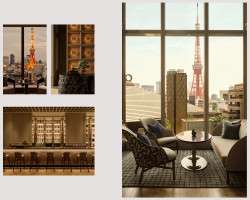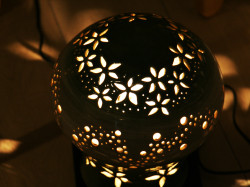
July 21, 2011
Simply Complicated
Hiroko Sebu offers contradiction and complexity for solo piano
By Metropolis
Originally published on metropolis.co.jp on July 2011

When composer and piano virtuoso Hiroko Sebu auditioned for a now-famous Google Chrome ad campaign, the ad’s producers asked her to sing a few songs. “But I’m not too confident in my singing voice,” she says. Instead, she wandered around the studio, picking up instruments and playing the songs they’d asked for, changing the arrangements as she went. She was shocked she got the part and even more shocked when she realized how big the campaign was going to be. The 30-second-long national TV spot quickly soared past a million views on YouTube. “People come up to me at shows and tell me that’s how they learned about me,” she says. Something else people say to her after shows? “They tell me they didn’t get it.”
Sebu, who has been playing piano and composing since toddlerhood, has her budding career neatly compartmentalized. “When I do film or television scoring, I’m working in someone else’s box,” she says. “When I compose for my albums, I do whatever I want. I like both, but there isn’t much overlap.” It’s no surprise people who know Sebu from her Google ad struggle with her live show, where the compositions on display are challenging swirls of modulation, texturalism, and abrupt change.
It’s the scoring work, of course, that gets Sebu paid, and she’s refreshingly circumspect about whether her iconic Google ad will change that—or if she even wants it to. “That ad was the first thing that made my musical style recognizable, so now I’m engaged in this process of trying to transcend myself and become unrecognizable again,” she says. “I don’t want my music to be identifiable like a Michael Jackson song.”
Her music is defined by a paradoxical complexity–one as intuitive as it is dizzying. “When I was in Paris, my instructors would always tell me to play something simpler, to not worry about being so complex. They thought I was intentionally trying to make my music complicated, but that’s just how it comes out.” Those instructors included master composers Antoine Duhamel and Gabriel Yared, the latter of whom invited Sebu to study in Paris on the strength of an unsolicited demo he received from her.
Music, ironically enough, was Sebu’s second choice. “Stephen Spielberg made me want to do music for films. I wanted to be a director, but I knew my talent was for music.” Here, too, Sebu’s influences are contradictory. The Spielberg fan is also partial to movies as complex and difficult as her music. “Guy Maddin. He’s one of my favorites,” she says. If there’s an anti-Spielberg, eccentric Winnipeger Maddin is probably him. “I want to make the musical equivalent of ambiguous, challenging indie films,” Sebu says. “I want to influence people in subtle, subversive, non-obvious ways.”
Sebu’s second album is in production. The first single is due on August 24. Finding a way to gig on the new material has been a challenge. Her scores tend toward full chamber instrumentation, and they’re heavy on multi-instrumental call and response. Arranging them for solo piano is laborious, and the resulting performances technically demanding
At her May 30 Mame Romantic show, Sebu gave a strong solo interpretation of her compositions’ multi-instrumental complexity. She’s taken to calling her music “architectural,” which brings to mind the textural minimalism of Steve Reich or, apropos of her film influences, Tony Conrad’s structuralism. During her performance it was easy to speculate that had Reich written for one piano instead of six the results might have been strikingly similar to Sebu’s work. Chords became arpeggios and then flams. Dynamics rose and fell, and melodies were harmonized correspondingly. But frequent key modulations and a tendency to make sudden shifts in tempo and time signature kept her performance clear of any pure minimalism and ensured that the contradictions that underlie her music were well-represented.
If this all sounds like something only a conservatory student could appreciate, that’s because much of it is. Sebu possesses a natural gift for the unnaturally intellectual and she was likely the only person in the room experiencing her performance on an instinctual level. The rest of us were engaged in continuous comprehension, which raises interesting questions about what listeners are looking for when they go to a show or put on a record, even if they’re discerning enough to bother with instrumental music in the first place.
“I’m really just trying to play around with sounds, and with musical ideas, and to constantly rediscover the joy of music, the fun,” Sebu said at the show, a sentiment she repeated in our later interview. It’s the kind of thing a lot of musicians say because they’ve heard other musicians say it, and because it makes them sound daringly unserious. In Sebu’s case, it’s without pretense, and perhaps that’s the most enticing thing about her music—complexity has never been approached so sincerely.
Hiroko Sebu @Haretara Sora ni Mame Maite, August 15. See concert listings (classical) for details.







